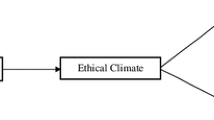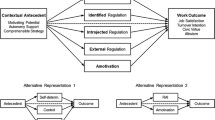Abstract
This study examines the influence of ethical fit on employee attitudes and intentions to turnover. The results of this investigation provides support for the conjecture that ethical work climate is an important variable in the study of person-organization fit. Ethical fit was found to be significantly related to turnover intentions, continuance commitment, and affective commitment, but not to job satisfaction. Results are discussed in regard to some of the affective and cognitive distinctions among satisfaction, commitment, and behavioral intentions.
Similar content being viewed by others
References
Betz, M. and B. Judkins: 1975, ‘The Impact of Voluntary Associations Characteristics on Selective Attraction and Socialization’,The Sociological Quarterly 16, 228–240.
Caldwell, D. and C. O'Reilly: 1990, ‘Measuring Person-Job Fit Using a Profile Comparison Process’,Journal of Applied Psychology 75, 648–657.
Chatman, J.: 1989, ‘Improving Interactional Organizational Research: A Model of Person-Organization Fit’,Academy of Management Review 14, 333–349.
Cook, J. D., S. J. Hepworth, T. D. Wall and P. B. Warr: 1981,The Experience of Work (Academic Press, San Francisco).
Dawes, R.: 1988,Rational Choice in an Uncertain World (Harcourt Brace Jovanocich, Orlando, FL).
Diener, E., R. Larsen and R. Emmons: 1984, ‘Person X Situation Interactions: Choice of Situations and Congruence Response Models’,Journal of Personality and Social Psychology 47, 580–592.
Downey, H., D. Hellriegel and J. Slocum: 1975, ‘Congruence Between Individual Needs, Organizational Climate, Job Satisfaction, and Performance’,Academy of Management Journal 18, 149–154.
Emmons, R. and E. Diener: 1986, ‘Situation Selection as a Moderator of Response Consistency and Stability’,Journal of Personality and Social Psychology 51, 1013–1019.
Fricko, M. M. and T. A. Beehr: 1992, ‘A Longitudinal Investigation of Interest Congruence and Gender Concentration as Predictors of Job Satisfaction’,Personnel Psychology 45(19), 99–117.
Gordan, R. L.: 1987,Interviewing (Dorsey Press, Chicago).
Hall, D., B. Schneider and H. Nygren: 1970, ‘Personal Factors in Organizational Identification’,Administrative Science Quarterly 15, 176–190.
Kohlberg, L.: 1984,The Psychology of Moral Development (Harper & Row Publishers, San Francisco).
Janz, T., L. Hellervik and D. C. Gilmore: 1986,Behavior Description Interviewing (Alan & Bacon, Boston).
Joyce, W. F. and J. W. Slocum: 1982, ‘Correlates of Climate Discrepancy’,Human Relations 35, 951–972.
Joyce, W. F. and J. W. Slocum: 1984, ‘Collective Climate: Agreement as a Basis for Defining Aggregate Climates in Organizations’,Academy of Management Journal 27, 721–742.
McGee, G. W. and R. C. Ford: 1987, ‘Two (or more?) Dimensions of Organizational Commitment: Reexamination of the Affective and Continuance Commitment Scales’,Journal of Applied Psychology 72, 638–642.
Meyer, J. P., S. V. Paunonen, I. R. Gellatly, R. D. Goffin and D. N. Jackson: 1989, ‘Organizational Commitment and Job Performance: It's the Nature of Commitment that Counts’,Journal of Applied Psychology 74, 152–156.
Mount, M. and P. Muchinsky: 1978, ‘Person-Environment Congruence and Employee Job Satisfaction: A Test of Holland's Theory’,Journal of Vocational Behavior 13, 84–100.
O'Reilly, C. A., III: 1977, ‘Personality-Job Fit: Implications for Individual Attitudes and Performance’,Organizational Behavior and Human Performance 18, 36–46.
O'Reilly, C. A., J. Chatman and D. F. Caldwell: 1991, ‘People and Organizational Culture: A Profile Comparison Approach to Assessing Person-Organization Fit’,Academy of Management Journal 34, 487–516.
Pervin, L. A.: 1968, ‘Performance and Satisfaction As a Function of Individual Environment Fit’,Psychological Bulletin 69, 56–68.
Posner, B. Z., J. M. Kouzes and W. H. Schmidt: 1985, ‘Shared Values Make a Difference’,Human Resource Management 24, 293–309.
Premack, S. L. and J. P. Wanous: 1985, ‘A Meta-Analysis of Realistic Job Preview Experiments’,Journal of Applied Psychology 70(4), 706–719.
Rothstein, M. and D. Jackson: 1980, ‘Decision Making in the Employment Interview: An Experimental Approach’,Journal of Applied Psychology 65, 271–283.
Rosenthal, R. and R. Rosnow: 1991,Essentials of Behavioral Research: Methods and Data Analysis (McGraw-Hill, New York).
Rynes, S. L. and B. Gerhart: 1990, ‘Interviewer Assessments of Applicant “fit”: An Exploratory Investigation’,Personnel Psychology 43, 13–34.
Schneider, B.: 1987, ‘The People Make the Place’,Personnel Psychology 40, 437–453.
Seashore, S. E., E. E. Lawler, P. Mirvis and C. Cammann (eds.): 1982,Observing and Measuring Organizational Change: A Guide to Field Practice (Wiley, New York).
Shore, L. M., L. A. Newton and G. C. Thornton: 1990, ‘Job and Organizational Attitudes in Relation to Employee Behavioral Intentions’,Journal of Organizational Behavior 11, 57–67.
Sigelman, L.: 1975, ‘Reporting the News: An Organizational Analysis’,American Journal of Sociology 79, 132–151.
Snyder, M., E. Berscheid and A. Matwyck: 1988, ‘Orientation Toward Personnel Selection: Differential Reliance on Appearance and Personality’,Journal of Personality and Social Psychology 54, 972–979.
Tom, V.: 1971, ‘The Role of Personality and Organizational Images in the Recruiting Process’,Organizational Behavior and Human Performance 6, 653–669.
Victor, B. and J. B. Cullen: 1988, ‘The Organizational Bases of Ethical Work Climates’,Administrative Science Quarterly 33(1), 101–125.
Weiss, D. J., R. V. Dawis, G. W. England and L. H. Lofquist: 1967,Manual for the Minnesota Satisfaction Questionnaire (Industrial Relations Center, University of Minnesota).
Author information
Authors and Affiliations
Additional information
Randi L. Sims is an Assistant Professor at Nova University in Fort Lauderdale, Florida. Her research interests include Ethical Decision Making, Business Ethics, and Academic Dishonesty. Dr. Sims has published in theJournal of Education for Business and Educational and Psychological Measurement.
K. Galen Kroeck is an Associate Professor of Management at Florida International University in Miami, Florida. Dr. Kroeck, an Industrial/Organizational Psychologist, is the Director of Doctoral Studies in the College of Business Administration and Chairman of the Florida International University Research Council. He has published in numerous magazines and journals, such as theJournal of Management and theJournal of Applied Psychology, and has two current textbooks in the field of Human Resource Management.
Rights and permissions
About this article
Cite this article
Sims, R.L., Kroeck, K.G. The influence of ethical fit on employee satisfaction, commitment and turnover. J Bus Ethics 13, 939–947 (1994). https://doi.org/10.1007/BF00881663
Issue Date:
DOI: https://doi.org/10.1007/BF00881663




